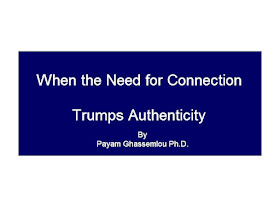As
a baby, you were an authentic being. Your laughter and tears were real. You
were also helpless and depended on your caregivers for survival. Your
caregivers had an important role in helping you feel securely connected to and
loved by them. The depth and genuineness of your current connection with others
stems from how successfully your caregivers managed their role as an attachment
figure. This complex interplay between the quality of attachment formed between
a child and a caregiver and one’s current ability to form significant
connections with others has been discussed extensively by many experts in psychology,
including Dr. Gabor Mate. In one of his talks, Mate has discussed how the need
for attachment can trump authenticity. When as a small child, your survival
depended on your caregivers, you were more likely to do whatever it took to
stay connected to them even if it meant hiding your true feelings. For example,
if your caregivers did not approve of your genuine expressions of anger or sadness,
most likely you hid them in favor of pleasing or staying connected to your
caregivers. In other words, for the sake of survival you had to choose
attachment over authenticity.
The
impasse of being real versus the need for survival continues into adolescence
and creates a unique challenge for gay youth and others who did not flow with
the mainstream. As a LGBTQ youngster, if you felt unsafe to express your real
essence, you probably had to create a fake or “straight acting” identity to
protect yourself from homophobic mistreatment. The need to hide contributed to
the dilemma of choosing survival over authenticity. It is important to have
empathy for your struggle of growing up in a heterosexist and homophobic
environment that made it scary for you to express your true essence. It is
important for many LGBTQ people to learn how to honor their true essence and
work on healing years of oppressive homophobic mistreatment. The price of not
individuating is summed up by a quote by Oscar Wilde, "Most people are
other people. Their thoughts are someone else's opinions, their lives a
mimicry, their passions a quotation."
Being
real and authentic can be a struggle if you spent most of your childhood
finding expression of authenticity as a threat to your survival. What helped
you to survive as a child may not serve you today. Relying on the old survival
mechanism of pleasing others has become a barrier to be fully present in your
significant relationships with others. The process of letting go of such a
survival mechanism in favor of honoring your true self involves psychological
labor of reaching out to your younger self. The inner child is the part of you
that was forced to hide and not show his or her genuine feelings. This part of
you needs help to connect with others without the mask of pretending or people
pleasing.
In
summary, since your ability to be authentic with yourself and others has a lot
to do with how you were treated growing up, it makes sense to examine how your
past impacts your life today. Psychotherapy can help you not only to heal from
childhood mistreatment that can hinder building healthy relationships with
others, but also other major life events that contributes to such problems.
For more
articles by Dr. Payam, please click on the following link: https://drpayam.com/articles_and_book



